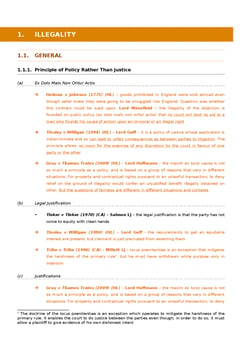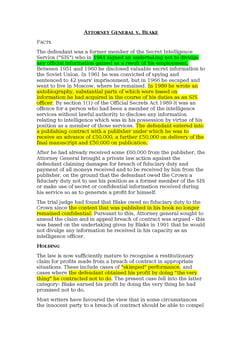B.P. Exploration v Hunt (No 2) [1982] 1 All ER 925
Judgement for the case B.P. Exploration v Hunt (No 2)
Table Of Contents
KEY POINTS
-
The elements of an unjust enrichment claim are:
(a) the defendant receiving a benefit;
(b) the defendant receiving the advantage at the plaintiff's expense; and
(c) the conditions in which it would be unfair to let the defendant keep the benefit.
Damages are intended to make up for loss or harm. The usual rule for 'economic' torts is that the measure is the amount of money that will put the injured party in the same situation as he would have been in if he had not sustained the injury.
FACTS
The Libyan government granted Mr. Nelson Bunker Hunt a fifty-year concession to explore for and extract oil from a specified area in the Libyan desert known as Concession No. 65. The concession required oil drilling to commence within three years.
In June 1960, Hunt, lacking the necessary resources and expertise for oil exploration, entered into a farm-in agreement with B.P. Exploration (Libya) Limited (referred to as "B.P."). The agreement consisted of two documents, a letter agreement, and a draft operating agreement (referred to as the "operating agreement"). Although the operating agreement was never formally signed, it was treated as if it had been, and it governed the relationship between Hunt and B.P.
The terms "if and when" in the agreement were used in the fifth and sixth terms because, in 1960 when the agreement was made, neither B.P. nor Hunt could predict with certainty whether oil exploration and development would result in commercially viable quantities of oil. If it did, B.P. would be entitled to the stipulated reimbursement. If not, B.P. would receive no reimbursement. The primary risk of failure in the venture was thus assumed by B.P.
Later, after BP had only been partially reimbursed, the Libyan government had their rights in the concession expropriated. According to BP, this frustrated the contract, and as a result, they were entitled to a "just sum" under section 1(3) of the Law Reform (Frustrated Contracts) Act of 1943.
JUDGEMENT
The contract had indeed been frustrated in 1971. Thus, in order to compensate BP for the benefits it gave to Hunt in accordance with Section 1(3) of the 1943 Act.
COMMENTARY
This case emphasizes how crucial risk allocation and contract interpretation are in intricate business contracts. It also emphasizes the necessity of legal rules concerning contracts that are frustrated when unexpected events don't go as planned
ORIGINAL ANALYSIS
BP agreed to carry out oil exploration for Hunt and site development on Hunt’s oil concession and to give H certain farm-in contributions (cash + oil).
In return, Hunt agreed top let BP have 50% share of an oil concession that he owned and to repay over time 125% of BP’s farm-in contributions and half the cost of exploration etc. Hunt agreed that he would give BP 3/8 of his own shares in the concession until he had repaid BP.
Later, both parties had their interests in the concession expropriated by the Libyan govt, after BP had only been repaid by 1/3. BP claimed that this frustrated the contract and that under s.1(3) Law Reform (Frustrated Contracts) Act 1943 they were entitled to a “just sum”.
At first instance the judge awarded money for the farm-in cash and oil received by the defendant and for the services rendered by the plaintiffs.
QBD dismissed an appeal against this sum.
Goff J
The “fundamental principle” of ss.1(2) and 1(3) is prevention of unjust enrichment.
The act is not designed to restore the parties to their position prior to the contract but to prevent unjust enrichment. It is also not for apportioning loss between the parties, and expenses are only relevant to the proviso of 1(2) and in working out the net benefit in 1(3).
Further, it is not to put the parties in the position they would have been in had the contract been performed.
If Plaintiff pays Defendant money for a return and the contract is frustrated before Defendant has incurred any expense and before the return is given, Plaintiff can reclaim all the money he has paid.
For Further Study on B.P. Exploration v Hunt (No 2)

Aspects Of Obligations notes fully updated for recent exams in the UK. ...
Need instant answers? Our AI exam tutor is here to help.
Ask questions 🙋 Get answers 📔 It's simple 👁️👄👁️
Our AI is educated by the highest scoring students across all subjects and schools. Join hundreds of your peers today.
Get StartedSimilar Cases
Related Product Samples
These product samples contain the same concepts we cover in this case.
| Restitution of Unjust Enrichment BCL | Bp Exploration V. Hunt Notes (9 pages) |
| Aspects Of Obligations | Grounds Of Restitution Notes (38 pages) |


 Since 2010, Oxbridge Notes has been a trusted education marketplace, supplying high-quality materials from top achievers at universities like Oxford, Cambridge, LSE, Harvard, and Yale.
Since 2010, Oxbridge Notes has been a trusted education marketplace, supplying high-quality materials from top achievers at universities like Oxford, Cambridge, LSE, Harvard, and Yale.